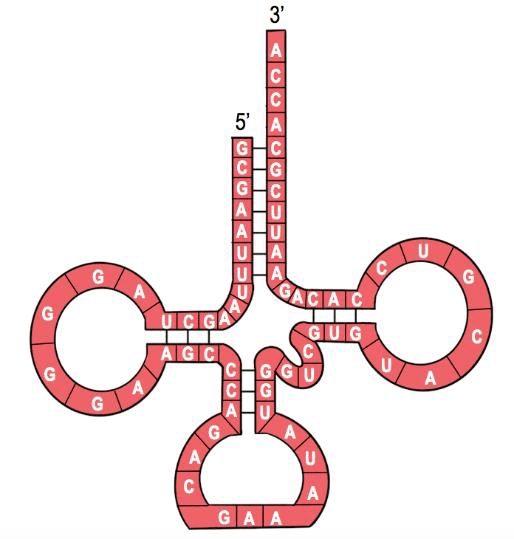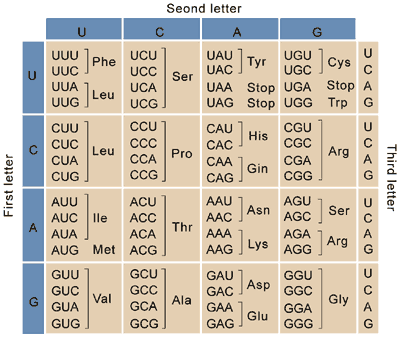This is the name of the bonds that hold the two strands of DNA together.
What are hydrogen bonds?
This is the name of the model for DNA replication where both parental strands are copied, and the resulting daughter molecules each have one parental and one new strand.
What is the semi-conservative model?
This is the full name of the RNA molecule that plays a key role in protein synthesis. 
What is transfer RNA?
This is the name for a group of genes that can be turned on or off.
What are operons?
This is the primary source of genetic variation.
What are mutations?
These two things compose the backbone of DNA.
What are sugar and phosphate?
All DNA polymerases synthesizes DNA in this direction.
What is 5' to 3'?
This is what the mRNA transcript will read of the template strand of DNA reads: 3'-TTACGGTCAGAC-5' (don't forget your directionalities!)
What is 5'-AAUGCCAGUCUG-3'?
This region acts as the "switch" for the entire operon
What is the operator?
This is the name of the procedure used to make multiple copies of DNA in a short amount of time.
What is PCR?
This is the percentage of cytosine in a DNA sample, if the thymine percentage is 23.5.
What is 26.5%?
After helicase 'unzips' the genes in DNA replication, these sections of copied DNA are created on the lagging strand.
What are Okazaki Fragments?
This is the reason why one gene can code for multiple proteins (Hint: where non-coding sequences of genes are removed and the remaining pieces are joined together)
What is alternative splicing?
The lac operon is usually off, but can be started, which means it is described as this.
What is inducible?
This mutation is a cause of Down Syndrome, because chromosomes do not separate properly during meiosis.
What is nondisjunction?
DOUBLE JEOPARDY
(Two part question!)
These are the pyrimidines of our DNA and RNA nucleotides, and their structure can be described as this.
What is Cytosine, Thymine, and Uracil, and single ring structure.
During which phase of the cell cycle does DNA replication occur?
The S-phase
These two modifications help prevent the degradation of mRNA as it moves from transcription to translation.
What is the 5' cap and the poly-A tail?
The repressor is the product of this separate gene, which is not part of the operon.
What is the regulatory gene?
A point mutation has occurred to turn the last nucleotide in the codon ACG to a T (ACG --> ACT). This is the type of mutation that has occurred as a result.

What is a nonsense mutation? (A type of point mutation)
This is how many hydrogen bonds exist between adenine and thymine.
What is two?
To describe the directionality of DNA further, the 3' end of DNA contains this type of R-group.
What is hydroxyl?
DOUBLE JEOPARDY
In prokaryotic transcription, this enzyme can bind directly to the DNA, which is a difference from these types of organisms.
What is RNA polymerase and eukaryotic organisms?
This processes helps modify chromatin structure, allowing for transcription to take place; because when DNA is tightly wound, it is less accessible for transcription.
Specifically, this process adds acetyl groups to histones, which loosens the DNA.
What is histone acetylation?
This is the part AND polarity of DNA that allows it to be attracted to the positive end of an electrode, allowing for gel electrophoresis to happen.
What is the negatively charged phosphate groups?